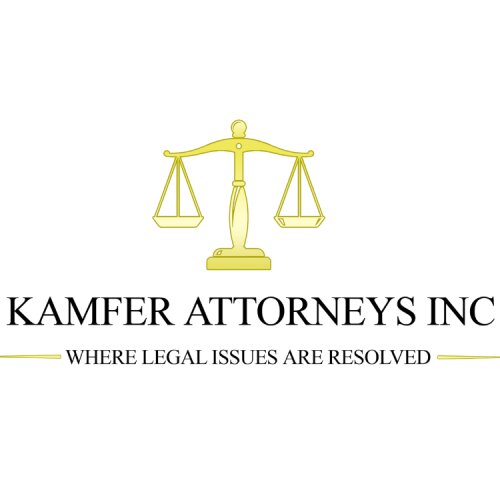Best Employment Rights Lawyers in Pretoria
Share your needs with us, get contacted by law firms.
Free. Takes 2 min.
List of the best lawyers in Pretoria, South Africa
About Employment Rights Law in Pretoria, South Africa
Employment Rights Law in Pretoria, South Africa, is governed by a framework that includes various acts and regulations designed to protect both employees and employers. The rights of employees are primarily outlined in the Basic Conditions of Employment Act (BCEA), the Employment Equity Act (EEA), the Labour Relations Act (LRA), and other relevant statutes. These regulations cover areas such as fair treatment, workplace safety, wage entitlements, leave provisions, and non-discrimination, ensuring a balanced and fair working environment for all.
Why You May Need a Lawyer
There are numerous situations where individuals may find legal assistance essential in matters of employment rights. Common scenarios include unfair dismissal, workplace discrimination, harassment, underpayment of wages, disputes over employment contracts, retrenchments, and issues regarding workplace safety. Legal expertise can help navigate these complex situations, ensuring that your rights are adequately protected and that you receive any compensation or remedial action due.
Local Laws Overview
Pretoria, as part of South Africa, adheres to the national laws governing employment rights, with a few specific considerations for local industries and economic circumstances. Key aspects include the regulation of working hours, termination procedures, conditions for temporary and casual employees, and affirmative action policies under the EEA. Pretoria’s diverse economy also necessitates additional considerations for sectors like manufacturing, public service, and technology, which may have specific legal stipulations regarding employment.
Frequently Asked Questions
What are my rights if I am unfairly dismissed?
Under the Labour Relations Act, you are entitled to contest an unfair dismissal. Legal processes through the Commission for Conciliation, Mediation, and Arbitration (CCMA) can be pursued, where a mediator will assist in resolving the dispute.
Can my employer change my working conditions without my consent?
No, significant changes to employment terms require consultation and agreement. If changes are made without your consent, you may need to seek legal advice or mediation.
How is workplace discrimination addressed legally?
The Employment Equity Act prohibits discrimination based on race, gender, and other characteristics. Legal avenues are available to contest discriminatory practices, including lodging complaints with the South African Human Rights Commission or pursuing legal action.
What steps should I take if I face workplace harassment?
If you experience harassment, report it to your HR department or a superior. Document all instances and seek legal advice if the situation is not addressed satisfactorily.
What is the legal stance on equal pay?
The law mandates equal pay for equal work under the Employment Equity Act. Discrepancies can be challenged legally if unjustified.
How many days of annual leave am I entitled to?
According to the BCEA, employees are entitled to a minimum of 21 consecutive days of annual leave for every 12 months of employment, usually interpreted as 15 workdays.
Are there specific laws regarding retrenchment?
Yes, retrenchment is subject to strict procedural requirements under the Labour Relations Act, including consultation processes, severance pay, and notice periods to ensure fairness.
What is the minimum wage in Pretoria?
The National Minimum Wage Act sets the minimum wage applicable in Pretoria, though specific sectors may have different stipulations. As of the most recent update, confirm the current rate from a reliable source or government announcement.
Can I be employed as a casual worker indefinitely?
The use of casual or temporary employment contracts is regulated to prevent long-term exploitation. If continuous employment exceeds a certain period, the employer may need to convert the contract to permanent status.
What recourse do I have if my employer doesn't pay my salary?
You can escalate unpaid wages issues by first addressing the employer directly. If unresolved, lodging a complaint with the CCMA or taking legal action may be necessary.
Additional Resources
For further assistance, the following resources might be beneficial: the South African Department of Employment and Labour, the Commission for Conciliation, Mediation, and Arbitration (CCMA), and the Legal Aid South Africa, all of which offer guidance and support for employment issues. Industry-specific unions and the South African Human Rights Commission are also valuable resources.
Next Steps
If you require legal assistance in employment rights, consider consulting with an attorney specializing in labor law. In Pretoria, numerous law firms specialize in employment law. Begin by gathering any relevant documentation and evidence related to your situation, and reach out to a qualified professional to evaluate your case and discuss possible legal remedies. Utilizing governmental and non-governmental support systems will also be beneficial during this process.
Lawzana helps you find the best lawyers and law firms in Pretoria through a curated and pre-screened list of qualified legal professionals. Our platform offers rankings and detailed profiles of attorneys and law firms, allowing you to compare based on practice areas, including Employment Rights, experience, and client feedback.
Each profile includes a description of the firm's areas of practice, client reviews, team members and partners, year of establishment, spoken languages, office locations, contact information, social media presence, and any published articles or resources. Most firms on our platform speak English and are experienced in both local and international legal matters.
Get a quote from top-rated law firms in Pretoria, South Africa — quickly, securely, and without unnecessary hassle.
Disclaimer:
The information provided on this page is for general informational purposes only and does not constitute legal advice. While we strive to ensure the accuracy and relevance of the content, legal information may change over time, and interpretations of the law can vary. You should always consult with a qualified legal professional for advice specific to your situation.
We disclaim all liability for actions taken or not taken based on the content of this page. If you believe any information is incorrect or outdated, please contact us, and we will review and update it where appropriate.

















